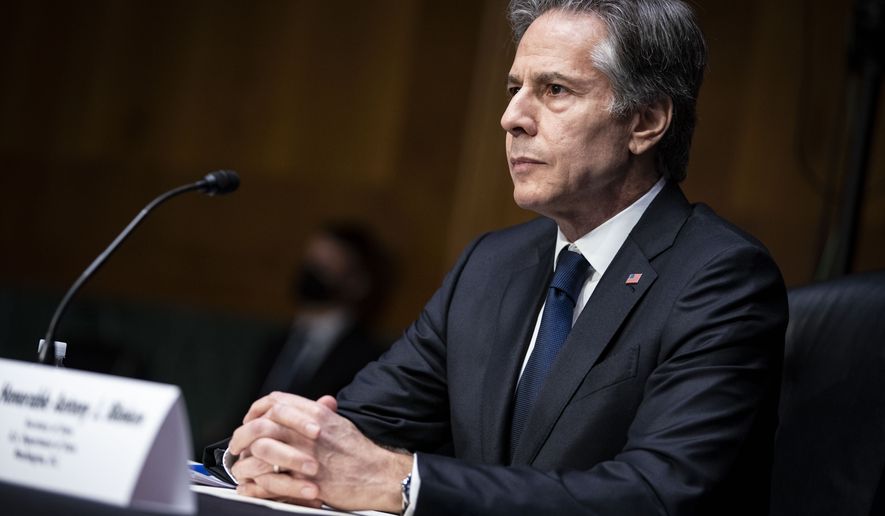President Vladimir Putin continues to have broad support inside Russia, Secretary of State Antony Blinken acknowledged Tuesday, lamenting that Mr. Putin’s state propaganda operations have effectively skewed many Russians’ view of reality.
Mr. Blinken told lawmakers on Capitol Hill that U.S. officials have found it “incredibly challenging” to affect Russian public opinion about Mr. Putin, even after his troubled war in Ukraine sparked harsh economic sanctions by the West.
The reason, Mr. Blinken said, is that Mr. Putin has over many years established “a state propaganda system that is such that whatever he says, whatever he communicates, a lot of people believe — never mind the facts, never mind what’s actually going on.”
“Penetrating that information system is incredibly challenging,” said the secretary of state, who added that the result finds Russians continuing to support Mr. Putin and the war even as deep economic hardship begins to grip the country.
At a Senate Committee on Foreign Relations hearing on the State Department’s budget Tuesday, Mr. Blinken added that U.S. officials are also struggling to gather accurate information about Russian public opinion due to a harsh crackdown on free speech by Mr. Putin since the start of the war in Ukraine. Most Western media outlets have shuttered their bureaus over reporting restrictions and fines, while Russian-based media are sharply limited in what they can report.
“There are severe penalties for doing or saying anything in opposition to Putin’s war, including 15 years in prison,” Mr. Blinken said. “So, to the extent we are able to read public opinion, some portion of that is definitely colored by the fact that people are afraid to speak their minds.”
SEE ALSO: NATO’s support of Ukraine could bring about nuclear war, Russian foreign minister warns
“This gets to the heart of the Achilles’ heel of any autocracy, which is the inability of anyone to speak truth to power,” he said. “This has severely misinformed Putin himself about what’s actually going on.”
Days after Russia entered Ukraine in late February, Mr. Putin imposed new laws banning the use of the word “war” to describe the invasion in Russian media reportage. The Kremlin also ramped up restrictions on foreign government news outlets such as the BBC, Deutsche Welle, and U.S. government-funded Voice of America and Radio Free Europe/Radio Liberty. Private social media giants Facebook and Instagram were also banned amid the crackdown.
“I’ve been involved in Russian journalism and politics for more than 20 years,” Russian journalist and author Vladimir Kara-Murza told the U.S. Commission on Security and Cooperation in Europe in a hearing on Russian propaganda in late March. “But it still shocked me just how quickly this new informational iron curtain has descended.”
Mr. Kara-Murza, who recently spent 15 days in jail over an interview he gave to CNN, is now facing criminal prosecution for allegedly spreading “false information.”
Lawmakers weighed in Tuesday on the Biden administration’s fiscal 2023 budget request of $60.4 billion for the State Department, a roughly 3% increase over the previous year. The U.S. Agency for Global Media, which supervises Voice of America and Radio Free Europe/Radio Liberty, has asked for $840 million for 2023.
Despite the repression, Mr. Blinken said it’s clear that “people increasingly in Russia are feeling the effects of the disastrous decision to attack Ukraine.”
SEE ALSO: North Korea’s Kim Jong-un vows to ramp up nuclear forces at nighttime military parade
“For example, upwards of 600 companies have left Russia, including many of the major consumer brands that we all know and are familiar with,” the secretary of state said. “Russians are finding that things they thought they could take for granted, they can’t. They can’t buy the things they’ve been used to buying for the last almost 30 years.”
“Their economy has contracted in a dramatic way. We see about a 15% contraction. The gains of the last 15 to 20 years of opening are being erased,” he said. “This is going to be felt more and more.”
“But there’s a tension between the information and propaganda system that Putin has set up that is very effective,” Mr. Blinken added. “I think the facts increasingly will encroach and make themselves felt. But for now, I think what we’re seeing is Russian people, to the extent that they are informed, continue to support for the most part President Putin.”
• Joseph Clark contributed to this report.
• Guy Taylor can be reached at gtaylor@washingtontimes.com.




Please read our comment policy before commenting.